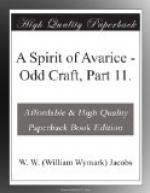“There, there,” said Mr. Blows. “Don’t take on; I forgive you.”
“Oh, John,” said his wife, sobbing convulsively, “I thought you was dead. I thought you was dead. It’s only a fortnight ago since we buried you!”
“Buried me?” said the startled Mr. Blows. “Buried me?”
“I shall wake up and find I’m dreaming,” wailed Mrs. Blows; “I know I shall. I’m always dreaming that you’re not dead. Night before last I dreamt that you was alive, and I woke up sobbing as if my ’art would break.”
“Sobbing?” said Mr. Blows, with a scowl. “For joy, John,” explained his wife.
Mr. Blows was about to ask for a further explanation of the mystery when he stopped, and regarded with much interest a fair-sized cask which stood in one corner.
“A cask o’ beer,” he said, staring, as he took a glass from the dresser and crossed over to it. “You don’t seem to ’ave taken much ’arm during my—my going after work.”
“We ’ad it for the funeral, John,” said his wife; “leastways, we ’ad two; this is the second.”
Mr. Blows, who had filled the glass, set it down on the table untasted; things seemed a trifle uncanny.
“Go on,” said Mrs. Blows; “you’ve got more right to it than anybody else. Fancy ’aving you here drinking up the beer for your own funeral.”
“I don’t understand what you’re a-driving at,” retorted Mr. Blows, drinking somewhat gingerly from the glass. ’Ow could there be a funeral without me?”
“It’s all a mistake,” said the overjoyed Mrs. Blows; “we must have buried somebody else. But such a funeral, John; you would ha’ been proud if you could ha’ seen it. All Gravelton followed, nearly. There was the boys’ drum and fife band, and the Ancient Order of Camels, what you used to belong to, turned out with their brass band and banners—all the people marching four abreast and sometimes five.”
Mr. Blows’s face softened; he had no idea that he had established himself so firmly in the affections of his fellow-townsmen.
“Four mourning carriages,” continued his wife, “and the—the hearse, all covered in flowers so that you couldn’t see it ’ardly. One wreath cost two pounds.”
Mr. Blows endeavoured to conceal his gratification beneath a mask of surliness. “Waste o’ money,” he growled, and stooping to the cask drew himself an-other glass of beer.
“Some o’ the gentry sent their carriages to follow,” said Mrs. Blows, sitting down and clasping her hands in her lap.
“I know one or two that ’ad a liking for me,” said Mr. Blows, almost blushing.
“And to think that it’s all a mistake,” continued his wife. “But I thought it was you; it was dressed like you, and your cap was found near it.”
“H’m,” said Mr. Blows; “a pretty mess you’ve been and made of it. Here’s people been giving two pounds for wreaths and turning up with brass bands and banners because they thought it was me, and it’s all been wasted.”




